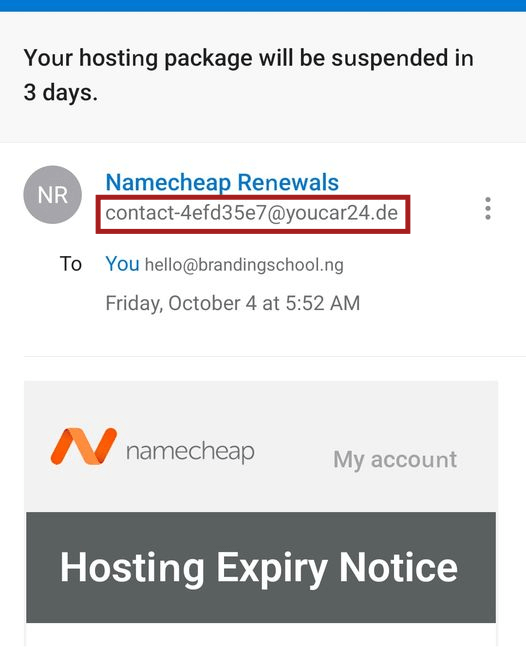Yeah! We’re getting close to the festive season and there are always lots of concerns when it comes to website security this period. So today, let’s talk about some security tips to keep your website safe during the Christmas holiday.
Some days ago, we got an email whose supposed sender is one of the reputable hosting platforms we use for our clients. The subject of the email was that the hosting plan of one of our services is about to expire. Guess what? It was a SCAM! Thank God our security antenna was alert.

But that’s not even the most interesting part. The most interesting part is that the email looked so original and genuine until we decided to check the sender’s email address, which is always hidden by default until one clicks on the sender’s name. That was when we realized it was a PHISHING EMAIL. Now, these are a type of online scam that targets consumers by sending them an e-mail that appears to be from a well-known source. They can be very dangerous because when you click on the links in that email, a malicious code is sent to your device that installs malware which can be used to get as much private data as possible.
Why are we sending this to you? It’s that time of year when cyber attacks are more prevalent. While you’re preparing for your breaks and vacations, hackers are also preparing to prey on as many unsuspecting folks as possible.
Why not? Due to the spike in online purchases and internet activities generally, there are many credit card details and other vital website data that can be harvested this Christmas holiday period.
Are you a website owner, and you want to enjoy your peace of mind and sanity all through December and the first quarter of 2025, then pay attention to these security tips to keep your website safe during the Christmas holiday:
1) Never take action on any email you receive until you have checked the sender’s email to be sure you’re truly in safe hands. You need a level of suspicion and paranoia to stay safe on the internet.
2) Remembering your passwords is not as important as staying safe. An easy-to-remember password is oftentimes an easy-to-hack password. It’s better if you can’t remember your password and you have it saved securely in a password wallet. If you use Chrome and are properly registered with your Google account, you can always enjoy their password saver features. And there are many password managers such as NordPass that you can download so you don’t have to remember the passwords.
3) If you’re using a CMS like WordPress, ensure you follow the security best practices. Keep your plugins and themes updated. Set up a 2FA for your administrator login credentials, and even on your cPanel. Have a solid security plugin in place to secure your login area. Also, if you can, get a reputable web management agency to handle the maintenance and security monitoring of your website. This is one of the services we render at Clarylife Global, and in our six years of existence, no website under our care has ever been lost to hackers.
4) Ensure regular backup of your website. Don’t sleep on this. You can get a professional to help you set up a cron job to handle routine website backups for you. This ensures that nothing gets you unprepared as far as a web attack is concerned.
Now, if you need our web support in any way, simply reach out to us for a FREE CONSULTATION. We are highly responsive across our channels.
